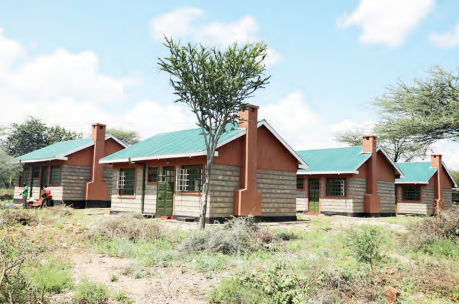
Sheila Nakure, 28, longed for the day when peace would prevail in Mukutani, Baringo county. “We would be escorted by armed security offi cers to fetch water and fi rewood.
Cooking outside in the evening was a tall order because you did not know when the next attack would occur,” Nakure, a member of the marginalised Ilchamus says.
Criminals waylayed her village and left with herds of cattle, leaving a trail of destruction. Today, peace is steadily being registered in Mukutani, thanks to interventions by security agencies.
A proposal to declare Mukutani a public forest has also helped. Nakure, a member of Lemaitai Mukutani Community Forest Association, says there are immense benefits associated with forest resources.
“As a member, I buy fruit trees at a discounted rate of Sh100 while non-members at Sh150. e fruit trees have improved nutritional value and increased tree cover,” she says.
Jones Kirati who served as a senior chief in Mukutani from 1981 to 2004 had to flee the area after retiring due to constant threats. “I moved to Kajiado with my family, leaving behind 10-acres. I bought two acres in Kajiado, but sold an acre to get school fees for my children,” he said.
“Insecurity peaked in 2005 due to land grabbing instigated by cattle raids.”
Lemaitai Mukutani Community Forest Association chairman Geoffrey Ole Ngusuranga said it took a long process to convert the community land to a public forest.
“Back in 1984, there was a tree nursery. We had plans to start a forest, but it did not pick up. In 2005, there was a raid and a number of people were killed,” Ngusuranga said.
The gazetted forest is in Baringo South but some Tiaty leaders have expressed interest in it. “We have been marginalised for several years because we did not have representation and we have tried to seek help from the government to no success,” he said.
The process to gazette Mukutani as a public forest started in 2012. e forest has two blocks, Lemaitai and Mukutani.
The Mukutani block lies along the Laikipia Escarpment and borders Laikipia Ranching to the East and is mainly hilly with gorges and river valleys.
The Lemaitai Block comprises the Lemaitai Hill and borders Lake Baringo to the West. The need for gazettement of two hills was informed by environmental, economic, socio-cultural and security challenges.
The Ilchamus community approached authorities in 2013 asking for advice on reservation of the area for conservation.
The community made a presentation at the International Colloquium in Eldoret in March, 2015 and said the gazettement was to also prevent degradation of the water catchment, grazing areas and riparian vegetation upstream.
Poverty in the area was also increasing due to loss of traditional livelihood sources caused by displacement of populations from their ancestral homes.
Other challenges included a spike
in human-wildlife conflict, natural
resource conflict and displacement
of the community from their ancestral land since 2005.











